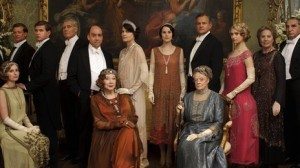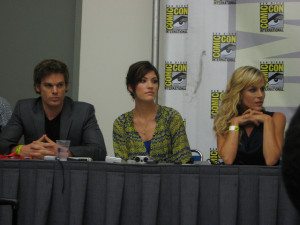Shows that should have ended
Downton Abbey
 This may sound strange coming from a die-hard fan of Downton Abbey, but I think that the show has long outrun its course. The first two series of Downton were television perfection; even the third was extremely good. But from the fourth series, it felt as if the show was missing something.
This may sound strange coming from a die-hard fan of Downton Abbey, but I think that the show has long outrun its course. The first two series of Downton were television perfection; even the third was extremely good. But from the fourth series, it felt as if the show was missing something.
Arguably one of the most drawing elements of Downton Abbey in its first few series was Mary and Matthew’s will they / won’t they romance. We all watched in fascination as Mary’s initial contempt against Matthew slowly dissolved as she discovered her true feelings. The couple’s path was not an easy one: obstacles included Matthew’s kind and compassionate fiancé, Lavinia Swire, and The Great War. There were many heart-breaking moments as Lady Mary prayed for a man that she loved but could not call her own. But finally, in the Christmas 2011 episode, Matthew proposed to her (in the snow!).
However, with Matthew dead and gone (thanks to Dan Steven’s fear of getting type-cast), Julian Fellowes didn’t have an easy task ahead of him. In order to recreate the excitement of the first series, he set up a new love triangle for Mary: should she choose Lord Gillingham or Charles Blake? Both men were incredible dull, and Mary herself became far more selfish. Her reaction to her suitors was a rather heartless ‘let battle commence’. The fifth series ended with the introduction of yet another suitor, played by Matthew Goode. It can all get a little tiresome.
I said that Downton has been missing that something ‘special’. I don’t necessarily think that this is the character of Matthew: rather, I’d argue that it is the character that Mary used to be. Viewers loved to watch the cold and sarcastic woman become the sensitive and feeling person that Matthew enabled her to be.
With reports that Downton will come to an end this year after its sixth season to allow writer Julian Fellows to work on a new project about 19th century New York, there is hope. Perhaps Fellows’ new period drama will recapture Downton in its prime.
Sandeep Purewal
[divider]
Gossip Girl
Six seasons is not a bad length for a high school drama; in fact, it is above average. However, time and time again, high school dramas have failed as they took the storyline beyond high school. It happened to 90210, and it happened to Gossip Girl, so much so that both shows almost circumvented college completely, or kept it as a backdrop without engaging with it apart from when it suited them. (Not very often).
As a drama centred on scandal, deceit, and the relationships between everyone and anyone, Gossip Girl particularly suffered from its college years and beyond as the show struggled to keep everyone interacting. To this end, characters disappeared without so much as a trace – what really happened to Eric (Connor Paulo)? – and the show became far more unrealistic. There were hotels being bought and traded for girlfriends; people coming back from the ‘dead’; royal weddings and divorces… The list is almost never ending.
Not only that, Gossip Girl suffered from inconsistent characterisations, repeated plotlines (which got very old, considering scandal was the be-all and end-all of the show), and so many characters I wish I had never met. If Gossip Girl had stayed in the high school years, these things may never have happened and we’d all be better off. Anyone remember Sage (Sofia Black D’Elia)? Or maybe even Bart’s (Robert John Burke) demise? How about Chuck’s (Ed Westwick) abusive tendencies which were brushed under the carpet?
Sure, the ten episodes in the sixth and final season managed to round stories up to some degree and that was nice… but did the writers really have to pair everyone off and give characters their ‘happy ending’? Couldn’t the writers have revealed who Gossip Girl was so much sooner, without being so disappointing? I’ll leave you to decide.
Halimah Manan
[divider]
Dexter
A show that peaked in its fourth season, the serial-killer drama ultimately failed to top the unsettling and sinister nature of John Lithgow’s performance as the ‘Trinity Killer’ with any of its later villains. Taken as its final season, it would have served as an abrupt if appropriate ending, the death of Rita confirming Dexter’s inability to ever truly lead a ‘normal’ life as a result of his own inner darkness. Whilst Michael C. Hall remained nothing less than entirely committed to the role of Dexter in the latter seasons of the show, the efforts of Scott Buck and the other writers became altogether poorer, effecting superficial changes to the status quo that only ever supported the holding pattern of Dexter always narrowly avoiding capture or retribution for his actions.
The problem was that the writers had allowed themselves to become infatuated with the character over the course of the show’s long run. This forced them to relegate the supporting cast to complete ineffectuality as a means of preventing them from ever discovering Dexter’s true nature. Confirming Miami Metro’s police detectives as the worst in the business, characters like Batista (David Zayas) and Quinn (Desmond Harrington) were characterised by illogical character decisions and trivial subplots that only existed to keep them off Dexter’s scent whilst those who did uncover his extra-curricular activities were summarily killed off.
Dexter’s final season confirmed the show’s dizzy tailspin, unsure what to do with Dexter’s sister Debra (Jennifer Carpenter) now that had become not only implicated in Dexter’s crimes but also involved in a vaguely incestuous romance subplot with her own – albeit adopted – brother. The show also committed one of the cardinal sins of writing when it retconned Dexter’s origin story at the very last minute, introducing Evelyn Vogel (Charlotte Rampling), a neuropsychiatrist who had supposedly played an influential if hidden part in the formation of Dexter’s ethics as advisor to his father.
A show limited by its own premise, Dexter always seemed predestined to end with a final, exhilarating reckoning of the man’s crimes at the hands of his colleagues and friends. Instead, the writers would falsely acquit him of his wrongdoings, believing the death of his sister a large enough price to pay for the many crimes he had committed, leaving its audience with the unintentionally hilarious coda of Dexter living out in Alaska as a lumberjack.
Lewis Reynolds
[divider]
Glee
As Glee announced that it would be airing its sixth and final season, ‘Gleeks’ mourned the imminent finale of their beloved show while others let out a sigh of relief that Glee, with its seemingly never-ending string of flamboyant, theatrical performances, would finally be taken off air.
So, it would seem, Glee falls into the category to which the likes of High School Musical and Twilight belong; notable for having split audiences into either die-hard fans or merciless critics. However, I would argue that as it limps painfully to the finish line, many have forgotten that Glee was once a great show, praised in fact, for having evaded that very niche and against all expectation becoming one of the most popular and acclaimed shows on television.
So, at what point did it actually become the “Glee” critics originally anticipated? I would argue, as it dived fatally into its fifth season. As ratings plummeted Glee’s creators severed McKinley and the new “Glee-clubbers’” from the show, assuming they were responsible for releasing the Grim Reaper on set. However, this only succeeded in drawing the show’s death even closer. Why? Well, because the original characters may be more popular, but they have nowhere to go. The new season operated under the delusion that viewers had an invested interest in whether or not Rachel Berry would ever become a Broadway star, when what really kept us glued to our seats was something entirely different: the need to know whether Glee club could really give these characters the confidence, love and acceptance they desperately needed or whether they would graduate in the same place we found them: creeping along McKinley’s hallways forever in fear of scheming Sue Sylvester and the next imminent “Slushie.”
The problem is the Glee kids have already escaped High School and gone on to better things. Now, the writers must resort to all new levels of ridiculousness to make their lives hell once again. Even the show’s self-deprecating narration seems to know that no number of show tunes and gimmicks can hide the fact that Glee has lost the plot, literally. Unlike the first four, seasons five and six lack the relatable characters and real conflicts that once made Glee great and had even musical theatre’s biggest critics rooting for its loveable underdogs and all the real teenagers they stood for.
Louise Newstead
[divider]
The OC
The OC’s season one is often described as being perfect. The first season saw Ryan Atwood (Benjamin McKenzie) leave his home of Chino and journey into the community of Orange County. The character’s adjustment into the materialistic society that is Newport Beach being a novelty obviously lessens as the character is integrated more into the community with superficial characters such as Summer (Rachel Bilson) also mellowing.
The series began with stellar writing with such iconic lines as “Welcome to the OC, bitch!”, from the first episode which garnered such critical acclaim even gaining a Writers Guild of America nomination. The first season ended how it began with Ryan gazing longingly at Marissa (Mischa Barton), a character who falls victim to the drama and pressures of Newport and struggles with drugs and alcohol as the series develops. In season one, the couple was the heart of the show, however, the writing of their relationship declined as the seasons went by.
The rest of the series was a seemingly gradual decline with season two experimenting with Marissa’s sexuality being simply a plot device to demonstrate the deterioration of the character, acting as a diversion from her relationship with Ryan. A cynic could also call it a desperate ratings grab. In season three, things got even worse with the introduction of Johnny – a boy who was in love with Marissa which led to his fateful demise. Season four was a slight improvement after the death of Marissa, but the replacement of Taylor to the core four was simply not enough to rejuvenate the show to its former glory.
It’s difficult to say when The OC should’ve ended as there were redeeming features of the later seasons, but all that can be said is that nothing could compare to the first season.
Eleanor Campbell


Comments